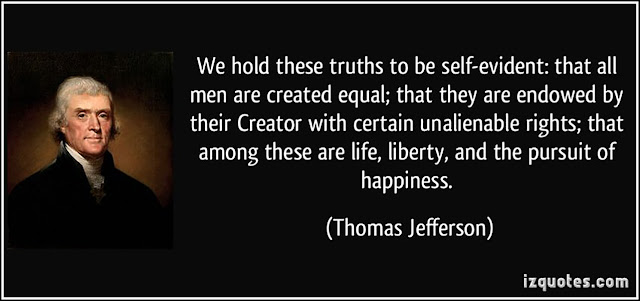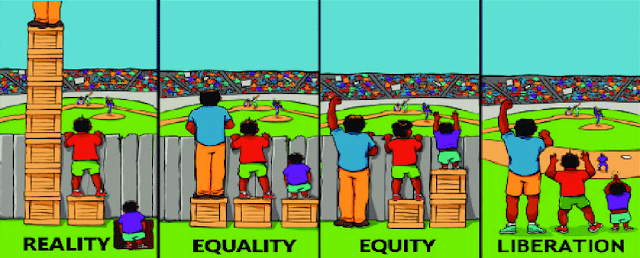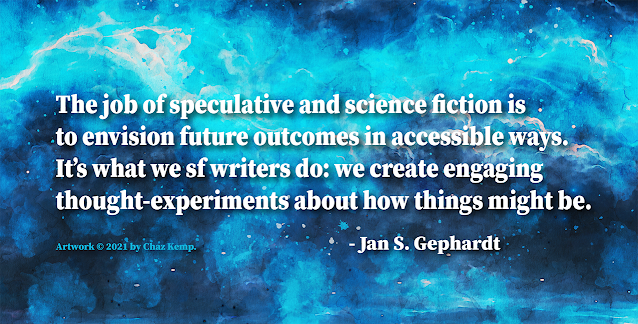The Future We Want – Part 3
Now here’s a radical thought: a country where equal civil rights for all is a reality. Do we have any such place in the world today? I can’t say for sure, but I do know one thing. The United States is currently no such place.
Yes, I know Thomas Jefferson’s words in the Declaration of Independence said it’s “self-evident” that “all men are created equal.” But even he and his fellow rich, white, male, slave-owning revolutionaries didn’t mean that literally.
I have been hearing a wide variety of exceptions and variations on this quote all my life, mostly to point out ways it’s not true or fudge the “rule,” rather than to seriously embrace the idea that it actually, like ever happens. Because, of course, we realize it doesn’t.
 |
| (Courtesy of Quote Thee). |
Equal, with Rights?
The rest of the “all men are created equal” thought immediately links equality to rights: “that they [the “all men” who are equal] are endowed by their Creator with certain unalienable Rights.” But, to quote another popular phrase, “The devil is in the details.” Certainly, Thomas Jefferson didn’t think “all men are created equal” meant all of humanity. Considering how he treated Sally Hemings, he certainly didn’t mean either women or slaves.
Nor did the US Constitution and the Bill of Rights clearly establish just exactly what “unalienable Rights” the Creator (or, more practically, the government) might have endowed upon them. “Life, Liberty, and the pursuit of Happiness” is a bit too vague and sweeping to be helpful in a court of law. It certainly can’t, and never did, guarantee equal civil rights for all.
I spent four weeks in July 2020 discussing the First Amendment alone, and how difficult it is to nail down specifics. If you’d like to see those posts, they start with “Freedom of Religion: Is the First Amendment an Aspiration?” (July 2, 2020) and run through “The Importance of Freedom of the Press” (July 29, 2020). But the quest for equal civil rights for all goes beyond the First Amendment.
 |
| (See credits below). |
Equality and Equity
It would be easy and convenient if equality and equity were the same thing, achievable by simple weights and measures. But they’re not. Equality means everyone gets exactly the same treatment, or pay, or goods, or whatever. And in some cases that’s exactly the right approach.
Two people do the exact same job for a company? They should be paid equally – even if one is a woman or a member of a minority. That’s not to say that if one does extra work s/he shouldn’t be paid a bonus. But again, each should get an equal chance to earn that bonus. That’s simple fairness.
Sometimes it’s that easy, but most of the time It’s not. To echo Napoleon the Pig in George Orwell’s Animal Farm, it becomes a problem when “some animals are more equal than others.” When the goal is actual, genuine equal civil rights for all? Oh, that’s never been easy! In fact, lately it seems to be growing harder and harder to secure.
 |
| (Courtesy of Magical Quote). |
A Tale of Two Little Girls
Here’s another equality/equity hypothetical situation. Say there are two smart little girls. One lives in a nice suburb, goes to an expensive science camp in the summer, and has a grandma in another city who likes to take her to the theatre and kids’ museums whenever she visits. She is well-traveled, well-fed, in excellent health, and her education never lacks for enrichment.
The other kid grew up in a series of shabby, drafty apartments, in between stints of living in the family car. She’s always hungry. She lives in a dangerous part of town, where people sometimes find dead bodies on the street or in their yards. Her mom works two jobs and can’t stay home with her much, so her auntie keeps an eye on her, along with her three cousins, whom the auntie favors. They never go out because Auntie’s immigration status is “iffy.”
Do these two little girls, of equivalent intelligence, both have an equal chance to do well in school? Of course not. That’s where the question of equity comes in. The first little girl has all kinds of advantages the second one can’t access without extra help from the school and the community. Help she may or may not (probably won’t) get, depending on where she lives and what the State Legislature’s priorities are And, as we all know, these priorities are rarely in the best interest of smart little girls in poverty-stricken neighborhoods.
 |
| (See credits below). |
What’s the End Goal?
The reality in which we live is far different from any abstract ideal of equality. And even equality needs adjustments in how resources are distributed, to provide true equity. The cartoon above offers a fourth state, “Liberation,” which deserves consideration as well. But, for today, let’s just focus on equal civil rights for all. And let’s define “equal civil rights for all” as equitable access to opportunities, equal protection under the law, and an equal say in how we are governed.
I’ve talked about equity and equality above. This series, “The Future We Want” focuses on not only what kind of future we want to live in, but how science fiction can help us form a vision of that future. A vision is essential, if we’re to achieve almost any goal. But what do we see around us? Certainly not equal civil rights for all! We must apply a large dose of imagination for that.
 |
| (See credits below). |
What Would Equal Civil Rights for All Look Like?
Equitable access to opportunities implies no glass ceilings, no systemic racism, and no history of apartheid and genocide – or appropriate reparations made, to recognize such a history. There’d be no antisemitism, no Islamophobia, or any other religious or ethnic bias. It would allow no gender, sexuality, identity, or age bias. (I’m already imagining the groans about political correctness, but wait! There’s more).
This hypothetical system also would accommodate for differently-abled candidates. We’d ideally be able to work out a system much like the “blind auditions” widely adopted by symphony orchestras and other, similar venues. What system could we use? Mm. Good question. But I’d welcome ideas in the Comments, about how to achieve more equitable access to opportunities for everyone.
Equal protection under the law would yield racially proportionate rates of conviction and incarceration – something we’ve never had in the United States. It would end the need for Black parents to give their children “The Talk” about what to do when they are (inevitably, no matter what they do) stopped by police. It would end the criminalization of poverty and the routine abuses to persons experiencing houselessness. And it would mean public defenders’ offices were as well-funded and prestigious as prosecutors’ offices.
 |
| (Courtesy of Moonsling). |
How about the Civil Rights the Civil Rights Movement Fought for?
An equal say in how we are governed would mean no gerrymandering (this a bitter issue with me right now, living as I do in the proposed-to-be divided Kansas Third District). It would mean that it would never be illegal to offer water and a sandwich to would-be voters standing in line for hours. It also would mean that no voters would have to stand in line for hours!
That there’d be widely-available mail-in balloting. That there’d be more than one drop-box for ballots in enormous districts such as Harris County, TX. And that all election officials would act in strictly nonpartisan manner.
An equal say in how we are governed would – in the United States – mean changes in the Senate (it’s extraordinarily undemocratic). Also, probably the abolition of the Electoral College (a system which routinely renders my Kansas-based vote for President irrelevant every four years). Both of these institutions were compromises designed to keep smaller states and minority populations from being drowned out by the influence of larger states. Neither “fix” is improving equity today in the way the Founders hoped.
 |
| (See credits below). |
Science Fiction and Equal Civil Rights for All
We need to see imagined worlds where it is possible to reach for, and maybe even achieve, more equal civil rights for all. In my opinion, one of the very best ways to do that is to create compelling, interesting stories about the future that show people what this concept would look like, feel like, and be like. Speculative and science fiction writers, this is our moment! Some of you may want to wallow in dystopia, but please! Offer us hope as well!
I care a great deal about equity and equality. It is one of the major themes that informs my science fiction. I designed Rana Station, the setting for most of my XK9 stories, as a place where all-too-fallible humans (and a couple of other species) try to create a place that helps all residents reach their full potential. But developing a vision for our world will need more than one small indie press, and more than one little-known writer advocating for better visions of the future.
It will need many more of us. It will need leaders in the field to stand up and say “this is worth writing about!” (thank you Neal Stephenson and Kim Stanley Robinson, for two examples of writers who are). Science fiction has changed the real world in many ways already. It’s time for us to do it again. And a good place to start is creating a vision of equal civil rights for all.
IMAGE CREDITS
Many thanks to Quote Thee for the Thomas Jefferson quote-image (originally from IZQuotes, but that page wouldn’t function for me). I also appreciate AZQuotes for the Harvey Milk quote; Quotesgram for the one from Elizabeth Cady Stanton; and BrainyQuote for the one from Chief Joseph (Montage by Jan S. Gephardt). And I’m grateful to Magical Quote for the Orwell “All animals” quote-image.
Angus Maguire created the “Reality-Equality-Equity-Liberation” image for Interaction Institute for Social Change, which holds the copyright and granted permission to use the image. I appreciate all! I created the “The Job of speculative and science fiction” image with some help from Chaz Kemp’s licensed Nebula 2 artwork, © 2021 by Chaz Kemp. This image was first used for my “Looking for Hope” post.
I’m grateful to Moonsling for the quote-image about equal protection under the law from Samuel Dash. I first assembled the quote from a tweet by the Rev. Raphael Warnock (now US Senator Warnock) in November 2020. It's now reformatted slightly and discovered that the background photo is originally from the Baltimore Sun, taken at the Maryland primary election, June 2, 2020 by the multitalented Karl Merton Ferron. Deepest appreciation to all of them!
No comments:
Post a Comment